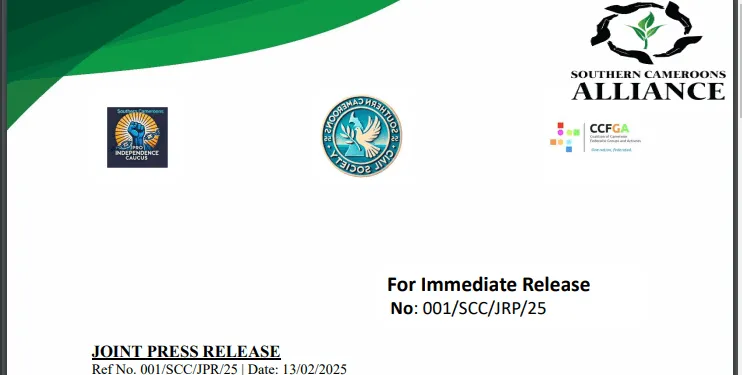Key factions in the Southern Cameroons’ quest for self-governance, have come together to sign a Memorandum of Understanding (MoU) aimed at fostering unity and coordinated action. The agreement, signed on December 31, 2024, and announced on February 13, 2025, represents a pivotal step towards addressing longstanding internal divisions that have hindered the movement’s progress. The MOU was signed by pro- federalist and pro-independence groups. It was signed by Gideon Asanji, representing the pro-independence Caucus; Micheal Takie of the Coalition of Cameroon Federalist Groups and Activists (CCFGA), representing the pro-federalist caucus. Ncham Godwill also signed on behalf of the Civil Society Caucus, and Atam Milan represented the Southern Cameroon Aliance.
A Unified Front
The MoU brings together diverse groups under a common framework:
- Pro-Independence Caucus: Advocating for full independence as the path to self-determination.
- Pro-Federalist Caucus: Advancing federalist solutions while upholding self-governance.
- Civil Society Caucus: Representing grassroots voices, prioritizing security, social justice, and inclusive dialogue.
- Southern Cameroons Alliance (SCA): Serving as the strategic coordinator and facilitator for collaboration.
This partnership respects ideological differences while fostering a common vision. It establishes a framework for dialogue, consensus-building, and united international engagement to seek a genuine and lasting resolution to the conflict.
Historical Context
The Southern Cameroons, formerly a British mandate territory, joined the Republic of Cameroon in 1961. Over time, tensions have escalated due to perceived marginalisation of the Anglophone regions by the majority Francophone central government. This has led to calls for greater autonomy or outright independence, culminating in the ongoing Anglophone Crisis. The current crisis began as peaceful protests in 2016. However, due to the Cameroon government’s highhanded approach, it soon escallated into an armed conflict.
Challenges and Human Rights Concerns
The conflict has resulted in significant human rights abuses and a humanitarian crisis. The International Crisis Group reports that more than 6,000 people have died, and over a million have been displaced. Accusations have surfaced against both government forces and separatist groups for committing atrocities, including unlawful killings, looting, and violence against civilians.
Sisiku Julius Ayuk Tabe, a leading figure in the independence movement currently imprisoned, emphasises the existential nature of the struggle: “We have an obligation—dead or alive—to bequeath to our children a nation that they can call theirs, something we have been deprived of for too long.”
Next Steps
The signatories of the MoU further extend an open hand to all stakeholders—domestically and globally—who are willing to support this initiative. They hope it will help craft a peaceful and just future for the former Southern Cameroons. They urge all parties to put the interests of the people above factional divisions.



